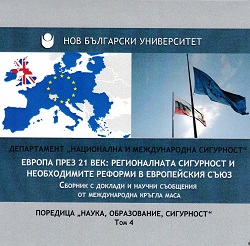Гранични територии, гранични хора: българите мюсюлмани и националната сигурност
Border areas, border people: Muslim Bulgarians and national security
Author(s): Milena Benovska-Sabkova, Ilia Nedin
Subject(s): Islam studies, Security and defense
Published by: Нов български университет
Keywords: border; Bulgarian Muslims; identity; Zlatograd; national security;
Summary/Abstract: "Border environment" is characterized by control of national states on their own territory, also by “separateness and otherness, i.e. to be culturally different from the core of the majority of the population"; areas of regional and international conflicts, but also of adapting trough their cultural heterogeneity and their role as areas of migration. Besides being barriers, boundaries can be characterized with the metaphor of the "bridge" that connects and enables the passage of people and their connectivity, incentives on trade and flow of goods. 467 The text is based on field research along the Bulgarian-Greek border in the regions of Zlatograd and Gotse Delchev. The following issues are addressed: the state borders of Bulgaria and Greece as a means to control the territories and people during the socialist period; the reasons for the treatment of Bulgarian Muslims as a threat to the national security of both Bulgaria and Greece during the period 1944-1989; changes in the functioning of borders and perception of border areas rather as a bridge of economic and cultural exchange during post-socialism; border as a bridge space of economic and cultural exchanges beyond 2010.
Book: Европа през 21 век : Регионалната сигурност и необходимите реформи в Европейския съюз
- Page Range: 466-476
- Page Count: 11
- Publication Year: 2017
- Language: Bulgarian
- Content File-PDF

